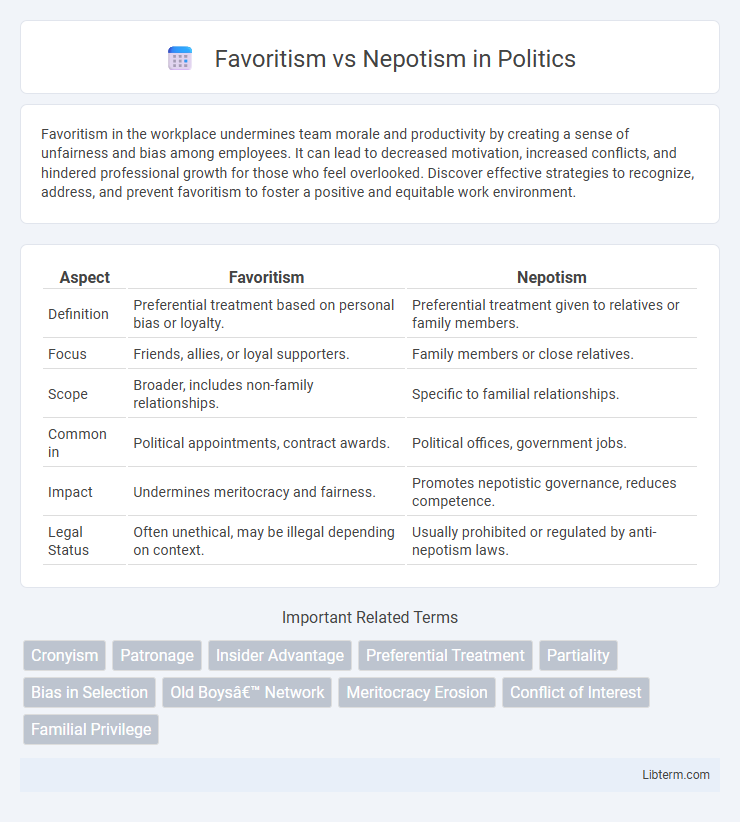Favoritism in the workplace undermines team morale and productivity by creating a sense of unfairness and bias among employees. It can lead to decreased motivation, increased conflicts, and hindered professional growth for those who feel overlooked. Discover effective strategies to recognize, address, and prevent favoritism to foster a positive and equitable work environment.
Table of Comparison
| Aspect | Favoritism | Nepotism |
|---|---|---|
| Definition | Preferential treatment based on personal bias or loyalty. | Preferential treatment given to relatives or family members. |
| Focus | Friends, allies, or loyal supporters. | Family members or close relatives. |
| Scope | Broader, includes non-family relationships. | Specific to familial relationships. |
| Common in | Political appointments, contract awards. | Political offices, government jobs. |
| Impact | Undermines meritocracy and fairness. | Promotes nepotistic governance, reduces competence. |
| Legal Status | Often unethical, may be illegal depending on context. | Usually prohibited or regulated by anti-nepotism laws. |
Understanding Favoritism: Definition and Examples
Favoritism refers to the practice of giving unfair preferential treatment to certain individuals based on personal relationships, rather than merit or qualifications. Examples of favoritism include promoting a less qualified employee because of friendship or consistently assigning desirable tasks to favored team members. Understanding favoritism is crucial for creating equitable workplaces and preventing morale issues linked to biased decision-making.
What is Nepotism? Key Characteristics
Nepotism is the practice of favoring relatives or close friends, especially by giving them jobs or advantages in professional settings. Key characteristics of nepotism include biased hiring or promotion decisions based on family ties, undermining meritocracy, and creating conflicts of interest within organizations. This practice often results in reduced morale and trust among employees due to perceived unfairness and lack of transparency.
Favoritism vs Nepotism: Core Differences
Favoritism involves preferential treatment based on personal likes or relationships, often extending beyond family ties, while nepotism specifically refers to favoritism granted to relatives regardless of merit. The core difference lies in nepotism's familial bias, which can undermine organizational fairness and meritocracy more overtly than broader favoritism. Understanding these distinctions is crucial for implementing fair workplace policies and maintaining ethical standards.
The Impact of Favoritism in the Workplace
Favoritism in the workplace often leads to decreased employee morale and increased turnover rates as employees perceive unfair treatment and lack of equal opportunities. Studies reveal that favoritism undermines team cohesion and productivity by fostering resentment among workers who feel overlooked or undervalued. Companies experiencing high levels of favoritism face challenges in attracting and retaining top talent, resulting in long-term negative effects on organizational performance and employee engagement.
How Nepotism Shapes Organizational Culture
Nepotism significantly shapes organizational culture by fostering an environment where family ties influence hiring, promotions, and decision-making, often leading to reduced meritocracy and employee morale. This practice can create divisions among employees, undermining trust and collaboration as favoritism towards relatives breeds perceptions of unfairness. Organizations with entrenched nepotism may struggle with talent retention and innovation due to biased leadership and limited diversity in perspectives.
Ethical Implications of Favoritism and Nepotism
Favoritism and nepotism undermine ethical standards in workplaces by promoting bias and unfair advantages based on personal relationships rather than merit or qualifications. These practices erode trust, damage organizational morale, and compromise decision-making integrity, leading to reduced employee motivation and potential legal consequences. Ethical frameworks emphasize transparency, fairness, and equal opportunity to prevent favoritism and nepotism, ensuring a culture of accountability and respect.
Legal Perspectives on Favoritism and Nepotism
Legal perspectives on favoritism and nepotism differentiate based on context and impact, with nepotism specifically involving family members, often triggering stricter scrutiny under anti-discrimination laws and workplace ethics policies. Favoritism, while broader and less defined, can be legally problematic when it violates equal employment opportunity regulations or fosters hostile work environments. Regulatory frameworks such as the U.S. Equal Employment Opportunity Commission (EEOC) guidelines and anti-corruption laws play critical roles in addressing and mitigating the legal risks associated with these practices.
Recognizing Signs of Favoritism and Nepotism
Signs of favoritism include consistently awarding promotions, raises, or desirable assignments to certain employees without transparent criteria, creating imbalance and resentment within the team. Nepotism becomes evident when family members or close relatives receive preferential treatment in hiring, advancement, or benefits despite lacking merit or qualifications. Identifying patterns of biased decision-making, lack of accountability, and exclusion of qualified candidates helps organizations address favoritism and nepotism effectively.
Strategies to Prevent Favoritism and Nepotism
Implementing transparent hiring processes with clear criteria and standardized evaluations reduces favoritism and nepotism in organizations. Encouraging regular training on ethical behavior and promoting a culture of accountability ensures fairness in decision-making. Establishing anonymous reporting systems and impartial committees for conflict resolution further prevents biased practices.
Building a Fair and Merit-Based Environment
Favoritism and nepotism undermine the foundation of a fair and merit-based environment by promoting biased decision-making and compromising organizational integrity. Establishing transparent evaluation criteria and implementing objective performance metrics help mitigate preferential treatment, ensuring that opportunities are awarded based on talent and achievement. Encouraging diversity, equity, and inclusion initiatives reinforces a culture where meritocracy prevails over personal relationships.
Favoritism Infographic

 libterm.com
libterm.com